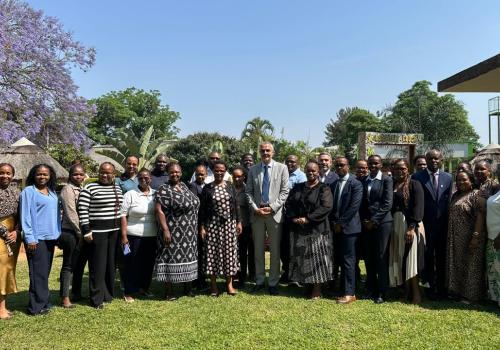The Southern African Development Community (SADC) Secretariat, in collaboration with the African Continental Free Trade Area (AfCFTA) Secretariat and the World Customs Organisation (WCO), conducted a five-day training workshop on the AfCFTA Rules of Origin in Ezulwini, Eswatini.
Held from 22 to 26 September 2025, the training was supported under the European Union–WCO Rules of Origin Africa Programme and funded by the German Federal Ministry for Economic Cooperation and Development (BMZ) through the GIZ CESARE Programme.
Officially opening the workshop, Ms. Lungile Mahlalela, representing the Principal Secretary in the Ministry of Commerce, Industry and Trade, welcomed the initiative and expressed appreciation to all partners, EU, GIZ, WCO, AfCFTA, and SADC, for their collaboration and support. She emphasised that the training would help ensure smoother compliance with trade rules by the private sector, ultimately facilitating more efficient cross-border trade and enhancing Eswatini’s competitiveness under the AfCFTA.
The workshop brought together approximately 30 trade and customs officials from Eswatini, providing them with in-depth technical guidance on the AfCFTA Rules of Origin. The sessions focused on enhancing participants’ ability to interpret and apply the rules effectively, a critical step in ensuring compliance and unlocking preferential trade benefits under the continental free trade agreement.
In her remarks, Ms. Motheba Malibeng, Programme Officer for Regional Trade at the SADC Secretariat, speaking on behalf of Mr. Dhunraj S. Kassee, Director of Industrial Development and Trade, thanked the Government of Eswatini for its confidence in SADC’s capacity-building efforts. She underscored the AfCFTA’s role in advancing the SADC Regional Integration Agenda and highlighted its alignment with the region’s Industrialization Strategy, which is anchored on developing regional value chains and consolidating the SADC Free Trade Area under the Regional Indicative Strategic Development Plan (RISDP).
The EU Ambassador to Eswatini, Mr. Karsten Mecklenburg, praised the strong partnership between the EU and SADC as a cornerstone of regional integration. He acknowledged the WCO’s role in building technical foundations for Rules of Origin across Africa through the EU-WCO programme and emphasized that the joint efforts of the EU, SADC, WCO, AfCFTA, and GIZ will have a lasting impact on Eswatini’s trade capacity and the broader region.
A highlight of the workshop was a site visit to the Fridge Factory, where participants observed production processes firsthand. The visit provided practical insights into how originating status is determined under AfCFTA provisions, reinforcing the theoretical knowledge shared during the training.
This training marked a significant step in Eswatini’s journey toward full participation in the AfCFTA and reflects SADC’s ongoing commitment to inclusive, sustainable trade development. By equipping officials with the tools to navigate complex trade protocols, the initiative strengthens institutional capacity and supports the broader goal of economic integration across southern Africa.

